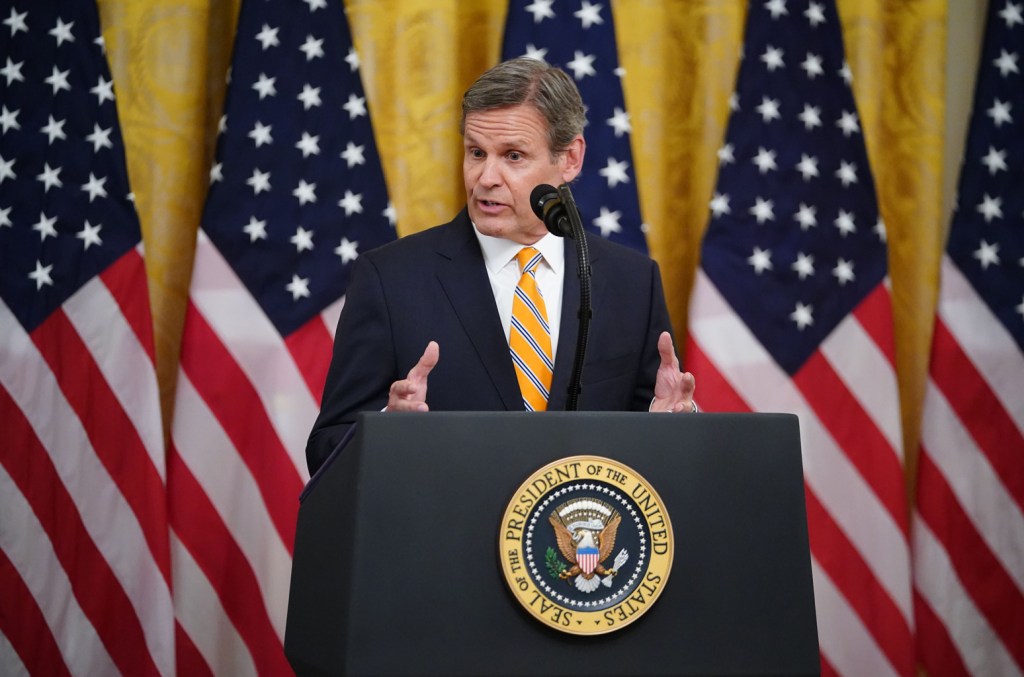Governor of Tennessee Bill Lee signed the ELVIS Act into law Thursday (March 21), legislation designed to further protect the state's artists from deep-fake artificial intelligence. The bill, more formally called the Voice and Image Security Act of 2024, replaces the state's old right-of-publicity law, which included express protections only for someone's “name, photograph or likeness,” expanding protections to include voice and artificial intelligence. -special concerns for the first time.
The ELVIS Act was introduced by Governor Lee in January along with State Senate Majority Leader Jack Johnson (R-27) and House Majority Leader William Lambert (R-44), and has since garnered strong support from the state's artistic class. Talent such as Lindsay Ell, Michael W. Smith, Natalie Grant, Matt Maher and Evanescence's David Hodges strongly supported the bill.
It also won support from the recorded music industry and the Human Artistry Campaign, a global initiative of entertainment organizations pushing for a responsible approach to artificial intelligence. The initiative has been joined by more than 180 organizations worldwide, including RIAA, NMPA, BMI, ASCAP, Recording Academy and American Association of Independent Music (A2IM).
Protection of the right of publicity varies from state to state in the United States, leading to a patchwork of laws that make it more complicated to enforce one's ownership of one's name, likeness, and voice. There is even greater variation among posthumous right-of-publicity laws. As concerns about AI impersonation have become more widespread in the last year, there has been a greater push by the music business to obtain a federal right of publicity.
The ELVIS Act replaces the Privacy Act of 1984, which was passed, in part, to extend Elvis Presley's publicity rights after his death. (At the time, Tennessee did not recognize a posthumous right of publicity.) Along with expressly enshrining a person's voice as a protected right for the first time, the ELVIS Act also expands what uses of a person's name, likeness, photograph, and voice are prohibited.
Previously, the Privacy Act only prohibited uses of a person's name, photograph and likeness “for advertising purposes”, which would not include the unauthorized use of AI voices for attribution purposes. The ELVIS Act does not limit liability based on context, so it may prohibit any unauthorized use, including in a documentary, song or book, among other media.
The federal government is also working on solutions to address concerns about publicity rights. Within hours of Governor Lee's introduction of the ELVIS Act in Tennessee in January, a bipartisan group of US House members unveiled the No Artificial Intelligence Fake Replicas And Unauthorized Duplications Act (No AI FRAUD Act), which aims to create of a framework for protecting one's voice and likeness at the federal level and defines First Amendment protections. It is said to complement the Senate's Nurture Originals, Foster Art and Keep Entertainment Safe Act (NO FAKES Act), a bill introduced last October.
While most of the music business aligns with the creation of a federal right of publicity, David the Israelite, President/CEO of the National Music Publishers Association (NMPA), warned in a speech delivered at a meeting of the Association of Independent Music Publishers (AIMP) in February that “while we 100% support the priority of record labels to obtain a federal right of publicity…it has not good odds. Within the copyright community, we don't even agree [it]. Guess who doesn't want a federal right of publicity? Cinema and TV. Guess who's bigger than the music industry? Cinema and TV”.
The issue of artificial intelligence voice cloning has been a controversial topic in the music industry ever since Ghostwriter released the so-called “Fake-Drake” song “Heart On My Sleeve,” which used AI technology without a license. In some cases, this form of artificial intelligence can present new creative opportunities—including its use for pitch records, lyric translations, real estate marketing, and fan engagement—but it also poses serious threats. If an artist's voice is cloned by artificial intelligence without their permission or knowledge, it can confuse, offend, mislead or even defraud fans.
from our partners at https://www.billboard.com/business/legal/tennessee-elvis-act-protecting-artists-voices-ai-impersonation-1235637934/
